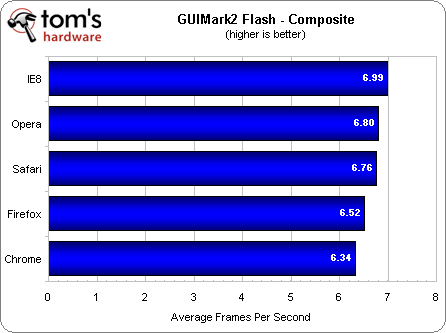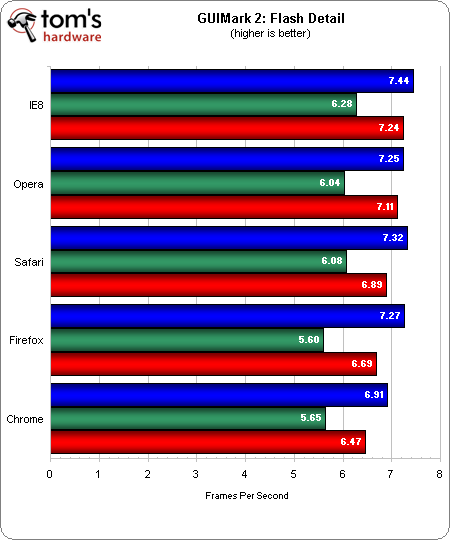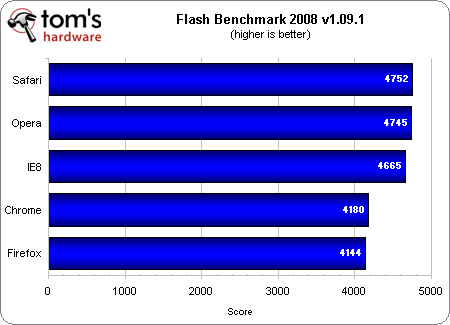Web Browser Grand Prix: Chrome 18, Firefox 11, Windows XP
Over the past two years, we've tested the top five Web browsers using modern PC hardware. But today, going against all that is sacred to the enthusiast crowd, we're breaking out an old beige box to bring you Web Browser Grand Prix: Windows XP Edition!
Flash Performance Benchmarks
GUIMark 2 Flash
Surprisingly, IE8 manages to hold onto Internet Explorer's proficiency with Flash, obtaining the highest score at nearly 7 FPS. Opera places second, followed closely by Safari at 6.76 FPS. Firefox comes in fourth with 6.5 FPS, leaving Chrome to finish last at 6.3 FPS.
The chart below holds the detail view of how each browser performs in the three individual GUIMark 2 Flash tests.
Flash Benchmark 2008
With 4752 points, Safari places first, with Opera only seven points behind in second place. IE8 takes third, trailed by Chrome in fourth and Firefox in fifth place.
The overall results of the Flash testing put IE8, Opera, and Safari out in front. Chrome and Firefox once again display a disadvantage in Flash performance relative to the other three browsers, although the margins aren't quite as wide on this time capsule of test system.
Get Tom's Hardware's best news and in-depth reviews, straight to your inbox.
Current page: Flash Performance Benchmarks
Prev Page DOM And CSS Performance Benchmarks Next Page Java And Silverlight Performance Benchmarks-
wheredahoodat "Both Opera and Chrome feltmuch smoother on our old PC than Firefox"Reply
I do kinda feel the difference with Firefox's responsive going from my main modern desktop to my older labtop that has regulated to a makeshift HTC. I believe Firefox XUL interface is the culprit; it was a big enough problem for Firefox mobile to abandon it in favor of native Android GUI, but who knows at this point. I guess might actually give Opera a chance. -
agnickolov How come only a single reader requested numerical composite scoring, that's the most logical way of scoring after all! With that said, I'd have liked if you didn't use the rankings but the raw scores after a more intelligent transformation as the input for weighted averaging...Reply
For example, for each category you could subtract the lowest-placed score from all scores and then normalize in the range by dividing all adjusted scores by the topmost adjusted score. This way the top perfomer always has 1 and the worst performer always has 0 modified score (you'd need to invert them for tests where lower is better of course, e.g. subtract these from 1). Then apply your ranks to these scores and you get the composite score. It's not a perfect transformation, but it certainly has more fairly distributed weight (pun intended) than what you have used here. -
aznjoka Thats my Opera, for those who have never tried Opera. It's an amazing piece of software, it does the job, and it does it better then most.Reply -
confish21 Interesting move to make this article. Well done! Don't waste your time on a vista run though... Im so close my release date. xDReply -
csbeer aznjokaThats my Opera, for those who have never tried Opera. It's an amazing piece of software, it does the job, and it does it better then most.Reply
XP can't run 9. Need to upgrade OS in order to get higher IE. -
mayankleoboy1 excellent review!Reply
some points:
1.A lot of corporates still use IE7. maybe you should include that too in your benchmarks
2.if you remove HTML5 (with and without H/W acceleration), i think Opera's victory margin will be quite huge.
3.Regarding smoothness, i beleive FF is quite poor in this. But the developers know about it and are very activle working on it. I thik FF13 will be the release when smoothness will improve. look at "Firefox Snappy".
4. i would like to have a subjective recommendation at the end of the article, something you subjectively felt was the best amongst all the browsers, even though it may be trailing in numbers. -
mayankleoboy1 Why did you use the AGP? I bet 99.99% of those Pentium4 era computers use the onboard Intel IGP.Reply
Also that would definitely disable the H/W acceleration of browsers.


